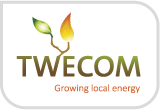Project Summary

The TWECOM project wants to sustainably valorize the up till now unused biomass from landscape elements for heat and energy production on a local scale. Landscape elements like hedgerows had an economic function in the past and are typical for a large part of NW-Europe.
In the 20th century this economic use disappeared. As a result, landscape elements disappeared in many regions. Because landscape elements also have ecological (biodiversity) and social (recreation, regional identity) functions, efforts for landscape management were set up. Unfortunately, this is quite expensive and not sustainable on a long term basis, as subsidies are not guaranteed in the future.
The TWECOM-project wants to revalorize the biomass from landscape elements in an economically feasible way, with respect for ecological and social functions. Therefor Natura 2000 will be taken into account as well as more regional ecological directives.
As the search for renewable energy sources is really actual, time has come to think about revalorization of this unused biomass. Because of the links with biodiversity and cultural heritage, tourism, recreation, this biomass has not been valorized yet in many cases. This project will prove that, through cooperation with all involved stakeholders, an economic (re)valorization is possible. As this is an actual issue in many parts of NW-Europe (similar agricultural and thus landscape element history), cooperation in this NWE-region is obvious and necessary.
Main aim:
TWECOM wants to demonstrate that local short chain valorization of biomass from landscape elements is economical feasible, with a surplus value for the current ecological, cultural and social functions that these landscape elements have.
Objectives:
- Objective 1: reveal an overview of available knowledge, experiences, information about all aspects of valorizing biomass on a local scale.
- Objective 2: jointly develop a basic planning tool to make valorization of biomass from landscape elements possible, taking into account ecological and social constraints.
- Objective 3: jointly work out a specific application of the planning tool for each region and test it in pilots of local short chain systems for valorization of biomass from landscape elements in different parts of the NWE region.
- Objective 4: integrate the knowledge and developed tool in local, national and European policy.
This project receives 50% funding from the European Regional Development Fund through Interreg IVB, North-West Europe. The total project budget is € 2.700.072.
Results:
You can find the results of the Twecom project in this report.
